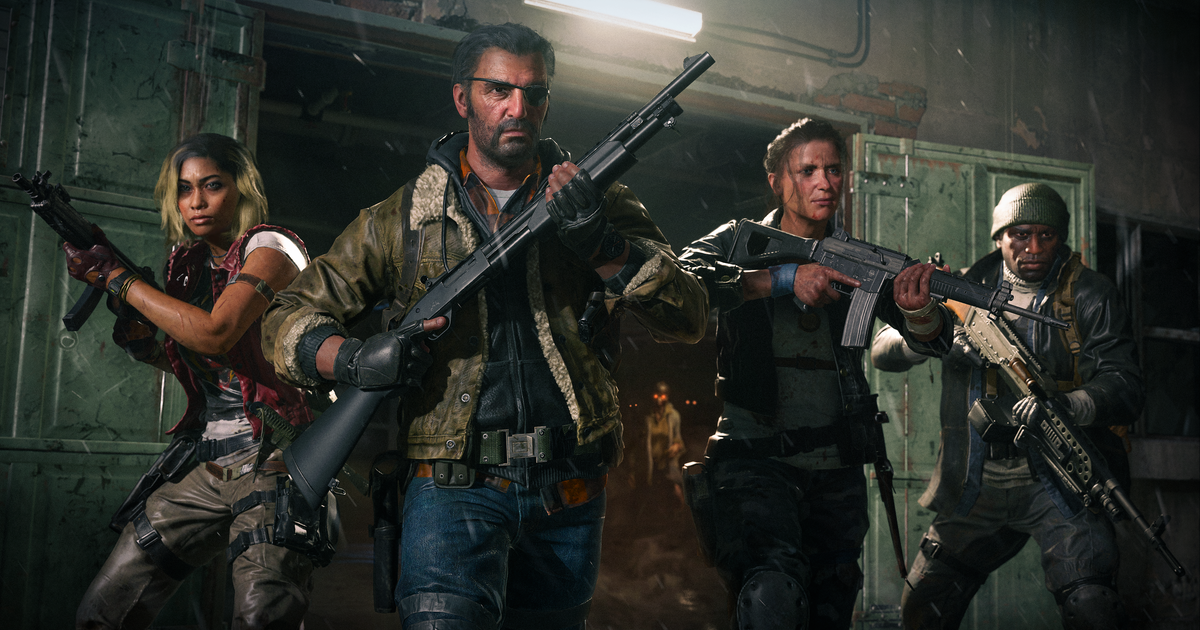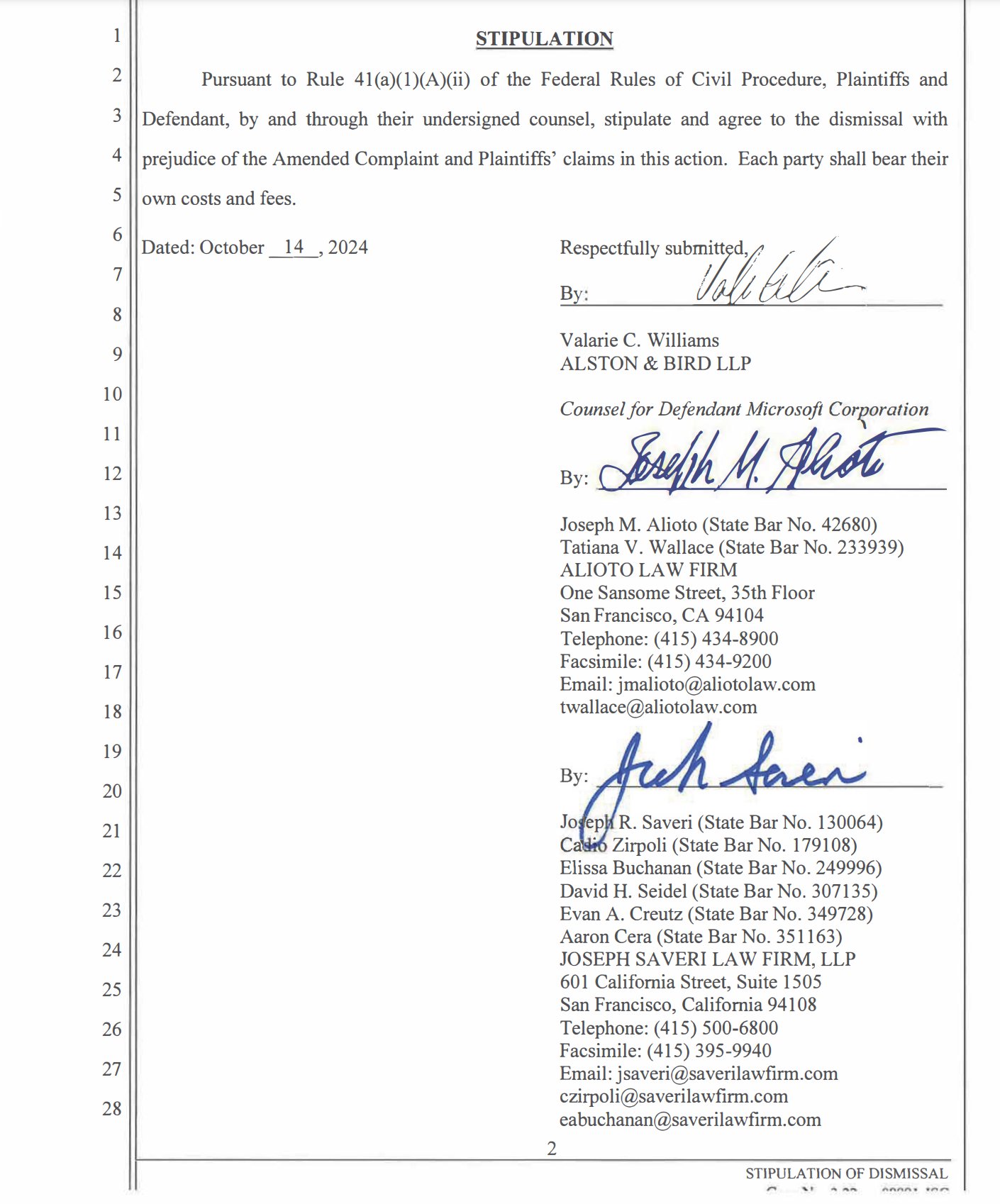You are using an out of date browser. It may not display this or other websites correctly.
You should upgrade or use an alternative browser.
You should upgrade or use an alternative browser.
Microsoft has settled its Antitrust Gamers Lawsuit Over $69B Activision Blizzard Buy.
LectureMaster
Has Man Musk

Terms of the settlement have not been disclosed.

Last edited:
Hero of Spielberg
Member
Each of the Plaintiffs receives one month of Game Pass Core.
Bumblebeetuna
Banned
Free copies of Redfall Bite Back Edition for every participant
adamsapple
Or is it just one of Phil's balls in my throat?
The Gamers Lost 
bitbydeath
Gold Member
StreetsofBeige
Gold Member
Settlements can be virtually nothing.
When Sony got caught making fake movie reviews long time ago, I think the settlement was something stupid like each person who tagged on to the lawsuit got a coupon for $5 off a future Sony movie.
Long time ago (must had been 10 years ago or more), I applied for a Dram lawsuit due to anti-competitive pricing for the hell of it. It was a legit thing. Maybe some of you even applied. I got a cheque in the mail for something like $10.
When Sony got caught making fake movie reviews long time ago, I think the settlement was something stupid like each person who tagged on to the lawsuit got a coupon for $5 off a future Sony movie.
Long time ago (must had been 10 years ago or more), I applied for a Dram lawsuit due to anti-competitive pricing for the hell of it. It was a legit thing. Maybe some of you even applied. I got a cheque in the mail for something like $10.
graywolf323
Gold Member
isn't that what usually happens when there's a settlement?lol dismissed with prejudice. The "gamers" can't refile. Judge was probably pissed at them.
Shake Your Rump
Banned
I still have my "$5 off any NES game" coupon that was sent out in 1993(?) from the Nintendo price fixing settlement.Settlements can be virtually nothing.
Last edited:
StreetsofBeige
Gold Member
On the plus side, settlements can be decent.I still have my "$5 off any NES game" coupon that was sent out in 1993(?) from the Nintendo price fixing settlement.
I lost $15,000 on a weed company. Stock got halted. Shady as shit. I claimed a loss so I saved a few thousand on capital gains on other stocks I made money.
I applied for class action lawsuit. After probably 4 years, I got back $3,500. Not bad. I was expecting nothing. But suddenly I got mailed two cheques since I claimed I bought the stock in two batches. Fuck ya. I'll take $3,500 back. Add it to the tax loss claim above and I probably ended up losing $9,000 instead of $15k.
the utmost tragedy ever heard.Each of the Plaintiffs receives one month of Game Pass Core.
Topher
Identifies as young
Daniel_Mallorca1985
Member

Microsoft Settles Gamers’ Antitrust Lawsuit Over $69B Activision Blizzard Buy
The lawsuit from gamers across multiple states claimed that Microsoft could cancel premium video game titles and raise prices.
Microsoft has settled an antitrust lawsuit brought by gamers challengingthe tech giant's $69 billion acquisition of Activision Blizzard.
The two sides on Monday notified the court of a deal to dismiss the lawsuit "with prejudice," meaning it can't be refiled. Terms of the agreement weren't disclosed. "Each party shall bear their own costs and fees," agreed the lawyers in a court filing.
The lawsuit, filed in California federal court in 2022 by gamers across multiple states, stressed that the merger will create among the largest video game companies in the world, with the ability to raise prices, limit output and reduce consumer choice. One example cited in the complaint was the possibility that Microsoft makes certain titles exclusive to Xbox. It was filed less than two weeks after the Federal Trade Commission sued to block the deal.
That case fell apart when U.S. District Judge Jacqueline Scott Corley denied the FTC's bid for a preliminary injunction, finding that Microsoft's ownership of Activision won't suppress competition in the video game library subscription and cloud gaming markets. She noted evidence indicating more access by consumers to popular Activision titles. Corley also found in this case that a court order temporarily blocking the deal isn't warranted because gamers could seek divestiture after the merger is consummated. Appeals followed.
The gamers urged the court to immediately set a trial data after the 9th U.S. Circuit Court of Appeals issues a ruling. Continuing to seek a ruling from the court ordering Microsoft to divest from Activision, they argued that the newly-merged company is harming them by cancelling premium titles and raising prices. Additionally, it claimed that Microsoft is undermining competition by, among other things, firing a significant number of Activision employees and rapidly increasing its Game Pass subscriber base.
Microsoft chief executive Satya Nadella recently testified that there are so-called "network effects" — the idea that the value of a product increases as more people use it — ensuring that platforms that grow to scale first have significant competitive advantages over smaller competitors because they receive more content from third-party developers, according to lawyers for the gamers. Internal company documents stated that "the first to scale wins" when it comes to content subscriptions. After the merger was completed, Game Pass grew from roughly 25 million subscribers in 2022 to over 35 million.
"As time passes, Microsoft continues to increase its market power, prices have increased, games continue to be cancelled, development capacities continue to diminish, and Game Pass continues to trend towards a monopoly," wrote Joseph Saveri, a lawyer for the gamers who also represents artists and authors in class actions against AI firms, in a court filling.
Microsoft has disputed the gamers' characterization of Nadella's deposition, in which he allegedly said that the company isn't a dominant player in certain gaming markets. It's also argued that the Game Pass subscriber growth metric is a "meaningless apples-to-oranges comparison" irrelevant to the heart of the case.
Last year, Microsoft closed the merger after extensive battles with regulators in the multiple regions. The deal married Microsoft, which owns the Xbox console, a game streaming service and the most popular personal computing operating system in the world, and Activision, maker of Call of Duty, Warcraft and Candy Crush. The company didn't immediately respond to a request for comment.
DeepEnigma
Gold Member
Microsoft Settles Lawyers' Antitrust Lawsuit Over $69B Activision Blizzard Buy
Fixed the headline to reflect reality.
Daniel_Mallorca1985
Member
The FTC is still pursuing its case.
Daniel_Mallorca1985
Member

Microsoft settles lawsuit from players attempting to block Activision Blizzard acquisition
Microsoft has settled the antitrust lawsuit from players attempting to block its acquisition of Activision Blizzard for…
Topher
Identifies as young

Microsoft settles lawsuit from players attempting to block Activision Blizzard acquisition
Microsoft has settled the antitrust lawsuit from players attempting to block its acquisition of Activision Blizzard for…www.eurogamer.net
"A year later, then, and players were seemingly unable to uphold their complaint, leading to the settlement of this case."
If that were the case then why would Microsoft even bother settling?
GHG
Member
"A year later, then, and players were seemingly unable to uphold their complaint, leading to the settlement of this case."
If that were the case then why would Microsoft even bother settling?
Because even when they lose, Microsoft always win baby.

Daniel_Mallorca1985
Member
DenchDeckard
Moderated wildly
The coalition and rare are two great studios though. I don't get this meme.




